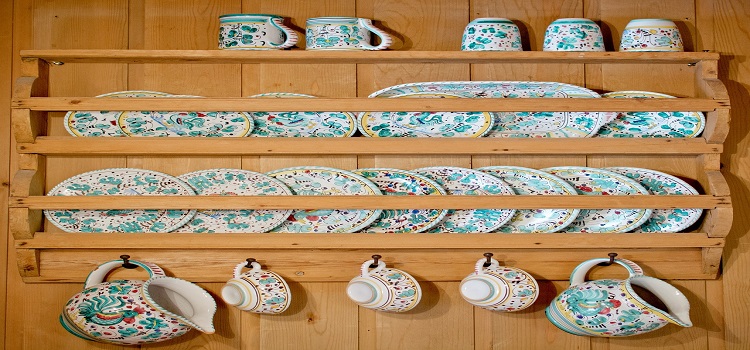As an Amazon Associate I earn from qualifying purchases.
The Lifespan of Ceramic Cookware: How Long Can You Expect It to Last?
Introduction: Ceramic cookware has gained popularity in recent years for its non-toxic, non-stick properties and durability. However, like all kitchen tools, it’s essential to understand its lifespan and how to care for it to maximize its longevity. In this guide, we’ll explore the uses, benefits, and factors affecting the lifespan of ceramic cookware, along with tips for maintenance and common FAQs.

Uses: Ceramic cookware serves various purposes in the kitchen:
- Cooking a wide range of dishes, from sautéed vegetables to simmering sauces, due to its versatility and even heat distribution.
- Safe for use on stovetops, ovens, and sometimes even microwaves, making it convenient for different cooking methods.
- Enhancing the presentation of food with its attractive appearance, whether serving directly from the stove to the table or transferring to serving dishes.
Benefits: Investing in ceramic cookware offers several advantages:
- Non-toxic: Ceramic coatings are free from harmful chemicals like PFOA and PTFE, making them a safer option for cooking.
- Non-stick: The smooth surface of ceramic cookware prevents food from sticking, making it easier to clean and requiring less oil or fat for cooking.
- Even heat distribution: Ceramic materials distribute heat evenly across the cooking surface, reducing the risk of hot spots and ensuring consistent cooking results.
- Durability: High-quality ceramic cookware can withstand high temperatures and is resistant to scratches, stains, and corrosion.
How Long Does Ceramic Cookware Last? The lifespan of ceramic cookware depends on various factors:
- Quality: High-quality ceramic cookware can last for many years with proper care, while lower-quality options may degrade more quickly.
- Frequency of Use: Regular use and exposure to heat can gradually wear down the ceramic coating over time.
- Care and Maintenance: Proper cleaning and maintenance, such as avoiding abrasive cleaners and utensils, can prolong the lifespan of ceramic cookware.
- Storage: Storing ceramic cookware properly, such as avoiding stacking heavy items on top of each other, can prevent damage and extend its longevity.
Maintenance Tips for Ceramic Cookware: To ensure your ceramic cookware lasts as long as possible, follow these maintenance tips:
- Hand wash with mild detergent and warm water after each use to remove food residue and prevent buildup.
- Avoid using metal utensils or abrasive scrubbers that can scratch or damage the ceramic coating.
- Dry thoroughly before storing to prevent moisture buildup and potential damage.
- Store in a cool, dry place away from direct sunlight and extreme temperatures.
- Periodically check for signs of wear or damage, such as chipping or flaking of the ceramic coating, and replace if necessary.
FAQ (Frequently Asked Questions):
- Can ceramic cookware go in the dishwasher?
- While some ceramic cookware is labeled as dishwasher safe, hand washing is recommended to prolong its lifespan and prevent damage.
- Can I use high heat with ceramic cookware?
- Ceramic cookware is generally safe for use with high heat, but avoid sudden temperature changes, as it can cause thermal shock and damage the cookware.
- Is ceramic cookware suitable for induction stovetops?
- Not all ceramic cookware is compatible with induction stovetops, so check the manufacturer’s instructions or look for induction-compatible labels before purchasing.
- Can I use metal utensils with ceramic cookware?
- It’s best to avoid metal utensils, as they can scratch or chip the ceramic coating. Opt for wooden, silicone, or plastic utensils instead.
- How can I prevent food from sticking to ceramic cookware?
- Preheat the cookware before adding food, use a small amount of oil or cooking spray, and avoid overcrowding the pan to prevent food from sticking.
- Can I use ceramic cookware in the oven?
- Many ceramic cookware pieces are oven-safe, but always check the manufacturer’s instructions for specific temperature limits and guidelines.
- How do I clean burnt-on stains from ceramic cookware?
- Soak the cookware in warm, soapy water and gently scrub with a non-abrasive sponge or brush. For stubborn stains, try using a paste of baking soda and water.
- Can I use ceramic cookware on glass cooktops?
- Yes, ceramic cookware is safe for use on glass cooktops, but avoid sliding or dragging the cookware across the surface to prevent scratching.
- Is ceramic cookware safe for use with acidic foods?
- Ceramic cookware is generally safe for use with acidic foods, but prolonged exposure to highly acidic ingredients may cause the ceramic coating to deteriorate over time.
- What should I do if the ceramic coating starts to chip or flake?
- Discontinue use of the cookware if the ceramic coating begins to chip or flake, as it may pose a health risk. Replace the cookware with a new piece.
Conclusion: In conclusion, ceramic cookware is a versatile and durable option for your kitchen, offering non-toxic cooking surfaces and even heat distribution. While the lifespan of ceramic cookware can vary depending on factors like quality and maintenance, proper care and attention can help extend its longevity. By following maintenance tips and being mindful of usage and storage, you can enjoy the benefits of ceramic cookware for many years to come. So invest in quality ceramic cookware, treat it with care, and savor the delicious meals it helps you create in your kitchen.
As an Amazon Associate I earn from qualifying purchases.
Leave a Reply